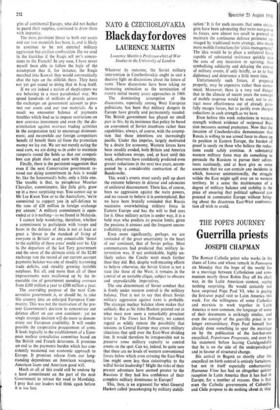Black day for doves
NATO & CZECHOSLOVAKIA LAURENCE MARTIN
Laurence Martin is Professor-elect of War Studies in the University of London
Whatever its outcome, the Soviet military intervention in Czechoslovakia ought to cast a decisive light on discussions about the future of NATO. These discussions have been taking on increasing animation as the termination of NATO'S initial twenty years approaches in 1969.
The dominating assumption of the discussions, especially among West European politicians, has been that military dangers in Europe have greatly and permanently receded. The British government has played no small part in this, by its insistence that policy be based on assessment of Soviet intentions rather than capabilities; always, of course, with the assump- tion that those intentions are increasingly pacific. Under this impetus, largely motivated by a desire for economy, Western forces have been steadily eroded, both Britain and America have withdrawn troops, and, at least until this week, observers have confidently predicted even greater reductions in the next two years, accom- panied by a considerable contraction of the Bundeswehr.
This week's events must surely pull up short the extreme believers in détente and advocates of unilateral disarmament. There has, of course, been no aggression against the NATO powers, and no reason to believe it is contemplated. But we have been brutally reminded that Russia maintains overwhelming military force in Eastern Europe and has the will to find uses for it. Once military action is under way, it is a bold man who predicts its precise limits, given the passions it arouses and the frequent uncon- trollability of combat.
Even more significantly, perhaps, we are reminded of the great uncertainty in the heart of our continent, that of Soviet policy. Most commentators had predicted that military in- tervention was, if not unthinkable, highly un- likely unless the Czechs went much further than they did. But, despite well-meaning efforts to- believe otherwise, the Soviet Union is not a state like those of the West; it remains in the control of an unstable clique, subject to obscure and unpredictable imperatives.
The one determinant of Soviet conduct that is firmly under western control is the military balance. That is not to say that direct Soviet military aggression against NATO is probable. The strategic nuclear balance alone makes that unlikely. But as Sir John Hackett pointed out in what must now seem a remarkably prescient letter to The Times last February, we cannot. regard as wildly remote the possibility that tensions in Central Europe may create military situations that spill over the East-West dividing line. It would therefore be irresponsible not to preserve some military capacity to control events on the spot. Can we, indeed, be quite sure that there are no levels of western conventional forces below which even crossing the East-West line might seem less than catastrophic to the wilful Soviet leadership? Might the risks of their present adventure have seemed greater to the Russians if they had less confidence of their complete military dominance in Europe?
This, then, is an argument for what General Hackett called 'peacekeeping by military stabili-
sation.' It is for such reasons that some strate- gists have been advocating that NATO reorganise
its forces, now almost too small to pretend to maintain the continuous defence perimeter en.
visaged by traditional NATO strategy, into much more mobile formations for 'crisis management.' The idea would be to place a unilateral force capable of substantial resistance quickly into the area of any incursion or uprising, thus symbolising solidarity and delaying the course of military events, if only briefly, so as to buy diplomacy and deterrence a little more time.
Unfortunately such forces, if prepared properly, may be expensive rather than econo- mical. Moreover, there is a very real danger that in the climate of recent years the concept of mobile response would be used, not to ex- tract more effectiveness out of already pain- fully meagre forces, but to justify even sharper reductions in such strength as we have.
Even before this week reductions in western strength without evidence of reciprocal Rus- sian measures seemed premature. Now that the invasion of Czechoslovakia demonstrates that Russia is willing to use armed force to shore up its position in Eastern Europe, the burden of proof is surely on those who believe the reduc- tions could safely continue. A substantial western military force may do something to persuade the Russians to pursue their adven- tures cautiously, and at least give us some assurance that we can contain any incidents in which, however unintentionally, the struggle within the East might spill over on to western territory. In a sense the maintenance of a degree of military balance and stability is the price of ensuring that political upheaval can proceed in communist Europe without bring- ing about the disastrous East-West confronta- tion all wish to avoid.


































 Previous page
Previous page